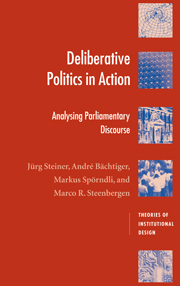Book contents
- Frontmatter
- Contents
- Acknowledgments
- Introduction: The research questions
- 1 Institutions and behavior: the example of consociational theory
- 2 The philosophical literature on deliberative politics
- 3 Measuring deliberation: a Discourse Quality Index
- 4 Understanding the real world of deliberation: hypotheses about antecedents and consequences
- 5 Antecedents of deliberation: institutions and issues
- 6 Discourse and its consequences
- Conclusion and research outlook
- Appendix: Discourse Quality Index (DQI): instructions for coders
- References
- Index
5 - Antecedents of deliberation: institutions and issues
Published online by Cambridge University Press: 22 September 2009
- Frontmatter
- Contents
- Acknowledgments
- Introduction: The research questions
- 1 Institutions and behavior: the example of consociational theory
- 2 The philosophical literature on deliberative politics
- 3 Measuring deliberation: a Discourse Quality Index
- 4 Understanding the real world of deliberation: hypotheses about antecedents and consequences
- 5 Antecedents of deliberation: institutions and issues
- 6 Discourse and its consequences
- Conclusion and research outlook
- Appendix: Discourse Quality Index (DQI): instructions for coders
- References
- Index
Summary
The preceding chapters laid out the theoretical framework for our study. It is now time to engage in an empirical analysis of political discourse as it can be found in the real world. We start by considering the institutional antecedents of discourse quality. Under what institutional arrangements does discourse in legislatures flourish? Which aspects of discourse are affected by those institutional arrangements? And how do issue attributes affect those aspects? These are the central questions of this chapter.
In this chapter, we test the first six hypotheses that were laid out in chapter 4 (the remaining hypotheses are tested in the next chapter). Thus discourse quality is correlated with five different institutional characteristic and one issue characteristic. The institutional characteristics, again, are: (1) consensus versus competitive democracy, (2) the influence of veto points and veto players, (3) presidential versus parliamentary systems, (4) second versus first chambers of the legislature, and (5) public versus non-public arenas. The issue characteristic is the extent to which prior positions on an issue are polarized. As we argued in the previous chapter, these institutional and issue characteristics provide a great deal of leverage on understanding the antecedents of discourse quality, and hence we expect them to give good insight into the conditions under which legislative discourse flourishes.
Our empirical analysis takes us to a variety of debates from four legislative settings: Germany, Switzerland, the United Kingdom, and the United States. These countries were selected because they provide variance on key institutional factors.
- Type
- Chapter
- Information
- Deliberative Politics in ActionAnalyzing Parliamentary Discourse, pp. 98 - 137Publisher: Cambridge University PressPrint publication year: 2005

